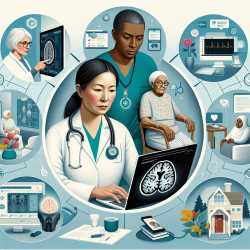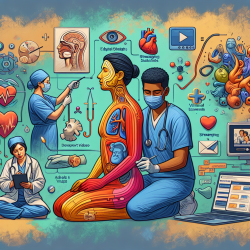Introduction
In the realm of neuro-oncology, family caregivers play a pivotal role in maintaining the quality of life for patients with primary brain tumors (PBTs). The challenges they face are immense, and their well-being is crucial to the caregiving process. A recent study titled "Neuro-oncology family caregivers’ view on keeping track of care issues using eHealth systems: it’s a question of time" sheds light on how eHealth systems can be leveraged to support these caregivers effectively. This blog explores how practitioners can enhance their skills by integrating the findings from this study into their practice.
The Role of eHealth Systems
eHealth systems offer a digital platform for monitoring and addressing care issues faced by family caregivers. The study reveals that caregivers appreciate a 'blended care' approach, which combines digital monitoring with personal feedback. This method not only provides insight into unmet needs but also facilitates timely professional intervention.
Implementing Blended Care
Practitioners can improve their skills by adopting a blended care model that includes:
- Digital Monitoring: Utilize eHealth applications to track caregivers' needs and stress levels over time. This can be done through regular digital check-ins or surveys.
- Personal Feedback: Ensure that caregivers receive personalized feedback based on the data collected. This feedback can guide them toward appropriate resources and support services.
- Flexibility and Accessibility: Allow caregivers to complete digital assessments at their convenience, preferably at home, to reduce stress and encourage honest responses.
Benefits of eHealth for Caregivers
The study highlights several advantages of using eHealth systems for caregivers:
- Insight and Control: Caregivers gain a better understanding of their needs, which can empower them to seek help proactively.
- Timely Support: Early identification of issues allows for timely intervention, potentially preventing caregiver burnout.
- Convenience: Digital platforms offer the flexibility to monitor care issues without the constraints of time and location.
Challenges and Considerations
While eHealth systems present numerous benefits, practitioners must also consider potential challenges:
- Time Investment: Caregivers need to invest time and discipline in consistently using these systems. Practitioners should provide encouragement and support to foster compliance.
- Privacy Concerns: Ensuring data privacy and security is paramount to gaining caregivers' trust in digital systems.
- Technological Barriers: Some caregivers may face challenges in using digital platforms due to a lack of technical skills. Providing training or alternative methods can help mitigate this issue.
Encouraging Further Research
Practitioners are encouraged to delve deeper into the research findings and explore additional studies on eHealth systems in caregiving. Understanding the nuances of caregiver preferences and needs across different cultures and healthcare systems can lead to more tailored and effective interventions.
Conclusion
Integrating eHealth systems into the caregiving process offers a promising avenue for supporting family caregivers in neuro-oncology. By adopting a blended care approach, practitioners can enhance their skills and provide more comprehensive support to caregivers. As the field of eHealth continues to evolve, ongoing research and adaptation will be key to maximizing its benefits.
To read the original research paper, please follow this link: Neuro-oncology family caregivers’ view on keeping track of care issues using eHealth systems: it’s a question of time.










